Roundup: Best Advice from Season 1
With Episode 112 we close out the first season of Adoption: The Long View. Thank you for making is so successful! I’m so grateful for all of you for listening. Thank you for tuning in, for sharing with others, and for continuing to support us.
Prefer to read Episode 112? Here’s a transcript (but listening is so much better).
I’m also grateful for the 12 amazing guests who talked with me during Season 1, a remarkable group made up of 4 adoptees, 4 birth parents, 4 adoptive parents, 1 researcher, 4 activists, 1 therapist, and 1 in a double-position (don’t even try with the math!).
Each has delved into the complexities of adoption in a way that helps us become more comfortable and effective at the difficult parts of adoptive parenting. I’ve found that these parts get easier just by acknowledging them, being willing to look at them.
Best Of Season 1: Twelve Guests on What Adoptive Parents Need to Know about the Long View
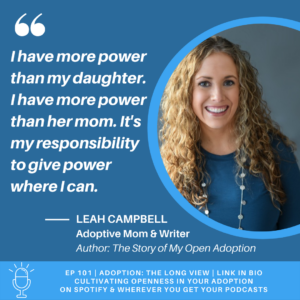
Ep101: Cultivating Openness in Your Adoption 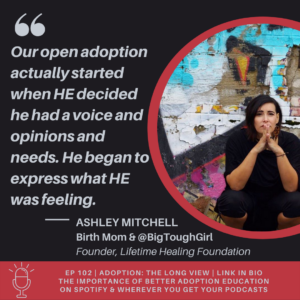
Ep102: Birth Mother Grief & Healing 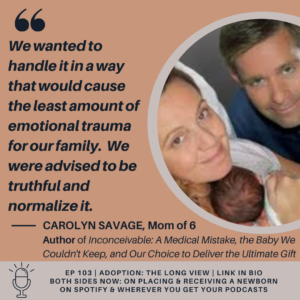
Ep103: Inconceivable Yet True 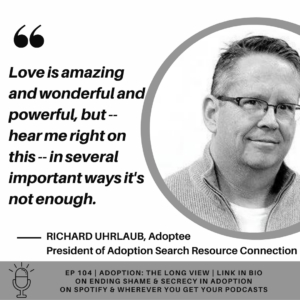
Ep104: Ending Shame & Secrecy in Adoption 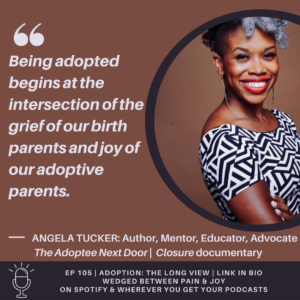
Ep105: Wedged Between Pain & Joy 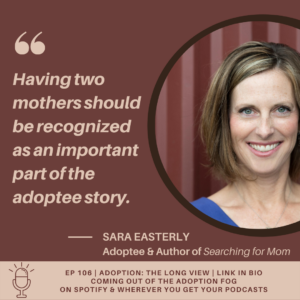
Ep106: “You’re not my real mom!” — what it really means. 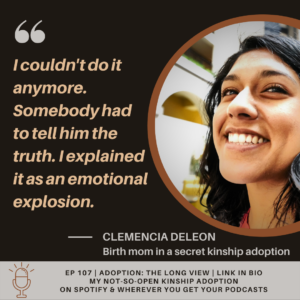
Ep107: My Not-So-Open Kinship Adoption 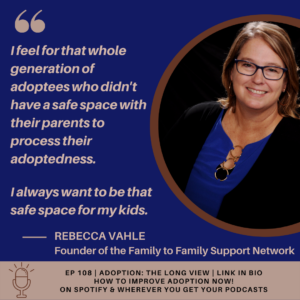
Ep108: Improving Adoption for Everyone Involved 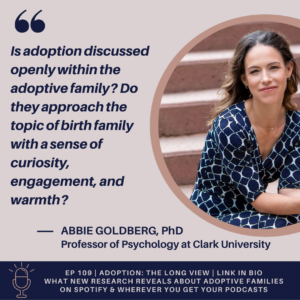
Ep109: Research & Stories of Families Living in Open Adoption 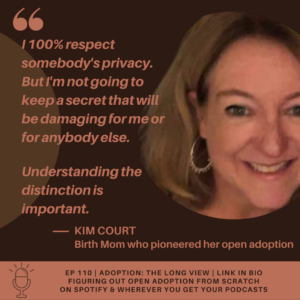
Ep110: Figuring out Open Adoption from Scratch 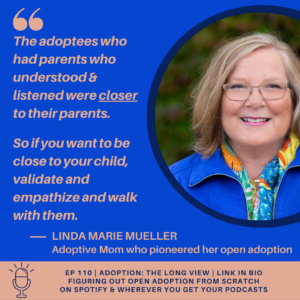
Ep110: Figuring out Open Adoption from Scratch 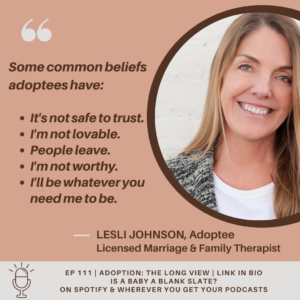
Ep111: The Adopted Baby as a Blank Slate? 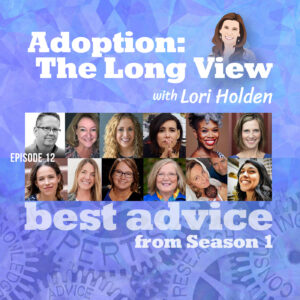
Ep112: Best Advice from Season 1
If you’ve been following along, you know that my guest and I talk about a provocative topic that adopting parents need to know the ins and outs of, or at least various perspectives. They share brilliant nuggets of wisdom with me, and before we know it our time is up.
I end each interview by asking each guest the same question: what’s your best advice for adoptive parents about the long view of adoption?
In Episode 112 you get the digest, the down and dirty clips of what each guest had to say to that question. You may be surprised with some of the commonalities among them, and you may be intrigued by the “special sauce” brought to the table by each guest and their unique perspective and experience.
Listen in to is what my fabulous guests have said when I asked them to boil things down to their best advice for adoptive parents about raising their children to healthy adults and with vibrant connection. We have a transcript available so you can easily find any episode you’d like to refer back to.
Show Notes from the Season 1 Roundup: Best Advice for Adoptive Parents
Click on the name to go to the guest’s own site, listed in order of appearance in Ep 112. Click on the episode number for that guest’s full interview.
- Leah Campbell: adoptive parenting and living in open adoption, even when it’s hard. Ep 101.
- Dr Abbie Goldberg: the latest research from following adoptive families for 15+ years. Ep 109.
- Richard Uhrlaub: shifting from shame and secrecy to truth and transparency. Ep 104.
- Angela Tucker: on being wedged between the pain of one set of parents and the joy of another. Ep 105.
- Sara Easterly: on the dreaded phrase “you’re not my real mom!” and coming out of the adoptee fog. Ep 106.
- Clemencia Deleon: how a birth mom found her voice when her kinship adoption that was supposed to be open went way wrong. Ep 107.
- Ashley Mitchell: a birth mom’s perspective and the necessity for better adoption education. Ep 102.
- Kim Court and Linda Marie Mueller: on figuring things out during the “pioneer days” of open adoption. Ep 110.
- Rebecca Vahle: how to improve adoption now, with the founder of Family to Family Support Network. Ep 108.
- Lesli Johnson, MFT: on babies as blank slates and the neuroscience of adoption. Ep 111.
- Carolyn Savage: her inconceivable story about pregnancy, adoption, and surrogacy, thanks to an unthinkable IVF lab mix-up. Ep 103.
- Episode 112 transcript
How to Tune In Regularly
You can find us on Adopting.com, and on these and other platforms.
- Spotify
- Apple Podcasts
- Amazon Podcasts
- Castbox
- Search for “Adoption Long View” on your preferred podcast platform.
A new episode comes out the first Friday of the month. Thank you for sharing, subscribing, and rating this episode!
Now on the list of Top 25 Adoption Podcasts!
We’ll Be Back Soon!
We’re taking a brief hiatus as we prepare for a stellar Season 2 early in 2021. Make sure to click the subscribe button wherever you get your podcasts so you know when we release new episodes. And please, do share with others who may benefit.
Until then, work on your own stuff, get comfortable with complexity and discomfort, listen to adoptee voices, and be aware of always being a safe space for your child to have their feelings.
And may you meet everything on your road ahead with confidence, capability, and compassion.
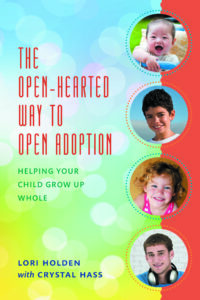
Lori Holden, mom of a young adult daughter and a young adult son, writes from Denver. She was honored as an Angel in Adoption® by the Congressional Coalition on Adoption Institute.
Her first book, The Open-Hearted Way to Open Adoption: Helping Your Child Grow Up Whole, makes a thoughtful anytime gift for the adoptive families in your life. Her second book, Standing Room Only: How to Be THAT Yoga Teacher is now available in paperback, and her third book, Adoption Unfiltered, is now available through your favorite bookseller!
Find Lori’s books on her Amazon Author page and catch episodes of Adoption: The Long View wherever you get your podcasts.

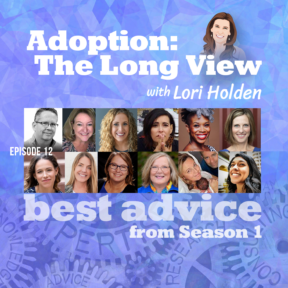
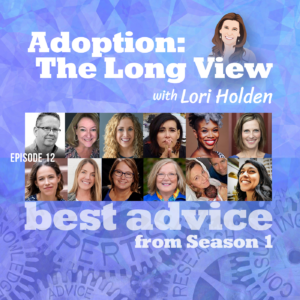
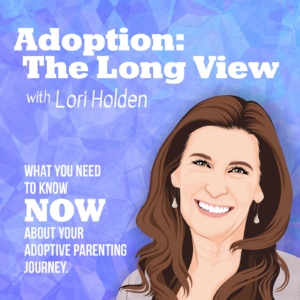
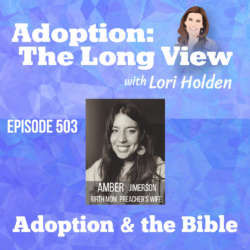
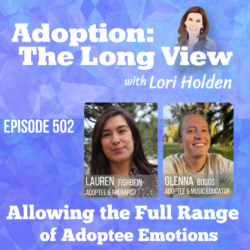
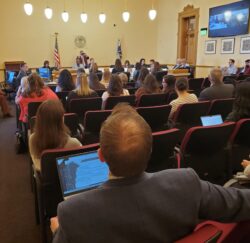
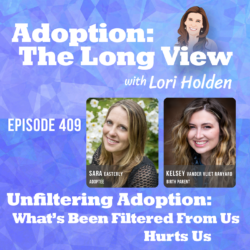

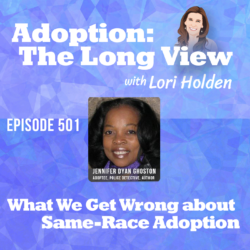
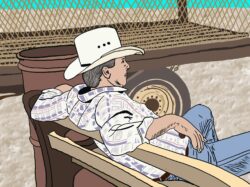
4 Responses
Adoption whistle blowers admit that about ten percent of the adoptions were necessary. Assuming your child had a bad beginning is nearly always not true and a grave disservice to your child. Yes separating a child is always trauma. But thinking genetics is a problem is wrong and disrespectful.
I agree with some of what you say, Denise. But none of what you say is actually in this episode or podcast. Did you listen?
I used to have some hope that you were able ally. Now it’s clear you’re just another typical AP looking to profit from your position of privilege and off the backs of your adoptlings. You really can’t stand to be challenged, can you…
Let me ask you…did YOU listen?
Did you just call my son and daughter a pejorative? Do you suppose they sometimes read here and can see your words? Did you mean to insult fellow adoptees due to your perceived betrayal by me?
I’ve asked you privately (but you haven’t responded), and let me also ask you here: what in this podcast episode specifically are you referring to?